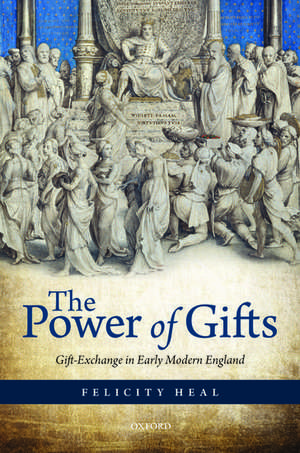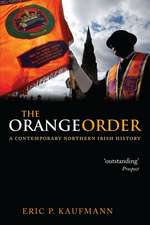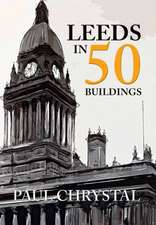The Power of Gifts: Gift Exchange in Early Modern England
Autor Felicity Healen Limba Engleză Hardback – 23 oct 2014
Preț: 730.64 lei
Preț vechi: 1049.77 lei
-30% Nou
Puncte Express: 1096
Preț estimativ în valută:
139.80€ • 146.36$ • 115.68£
139.80€ • 146.36$ • 115.68£
Carte tipărită la comandă
Livrare economică 25-31 martie
Preluare comenzi: 021 569.72.76
Specificații
ISBN-13: 9780199542956
ISBN-10: 0199542953
Pagini: 272
Ilustrații: 11 black and white illustrations
Dimensiuni: 162 x 240 x 23 mm
Greutate: 0.56 kg
Editura: OUP OXFORD
Colecția OUP Oxford
Locul publicării:Oxford, United Kingdom
ISBN-10: 0199542953
Pagini: 272
Ilustrații: 11 black and white illustrations
Dimensiuni: 162 x 240 x 23 mm
Greutate: 0.56 kg
Editura: OUP OXFORD
Colecția OUP Oxford
Locul publicării:Oxford, United Kingdom
Recenzii
This is scholarship of a high order, written with a precise sensitivity to terminology and a verve which carries the analysis along. Heal's achievement is one to savour and enjoy.
This is an ambitious book which, in little more than 200 pages, offers a rich survey of the perils, power and practices of gift-giving and receiving under the Tudor and Stuart dynasties.
Heal poses important questions about social interaction at many levels throughout the course of 150 years.
Heal makes a convincing case for the powerful role of gifts in early modern England. Readers will appreciate her deft intertwining of theoretical frameworks and historical analysis, as well as her use of wide-ranging sources and well-chosen anecdotes ... Scholars of early modern society, culture, and politics will find much to benefit them in The Power of Gifts.
This is an ambitious book which ... offers a rich survey of the perils, power and practices of gift-giving and receiving under the Tudor and Stuart dynasties
This is an important work, well written and illustrated ... the scholarship is impeccable and the analysis sensitive and shrewd. Heal has given us an illuminating insight into a key dimension of the political culture of early modern England.
rich and illuminating ... a fine piece of historical analysis, which crosses the traditional boundaries of social, cultural, and political history.
This is an ambitious book which, in little more than 200 pages, offers a rich survey of the perils, power and practices of gift-giving and receiving under the Tudor and Stuart dynasties.
Heal poses important questions about social interaction at many levels throughout the course of 150 years.
Heal makes a convincing case for the powerful role of gifts in early modern England. Readers will appreciate her deft intertwining of theoretical frameworks and historical analysis, as well as her use of wide-ranging sources and well-chosen anecdotes ... Scholars of early modern society, culture, and politics will find much to benefit them in The Power of Gifts.
This is an ambitious book which ... offers a rich survey of the perils, power and practices of gift-giving and receiving under the Tudor and Stuart dynasties
This is an important work, well written and illustrated ... the scholarship is impeccable and the analysis sensitive and shrewd. Heal has given us an illuminating insight into a key dimension of the political culture of early modern England.
rich and illuminating ... a fine piece of historical analysis, which crosses the traditional boundaries of social, cultural, and political history.
Notă biografică
Felicity Heal is an emeritus fellow of Jesus College and was a lecturer in History at the University of Oxford from 1980 to 2011. She is the author of numerous books and articles on sixteenth- and seventeenth-century Britain, including Reformation in Britain and Ireland (2003), The Gentry in England and Wales 1500-1700 (with Clive Holmes, 1994),and Hospitality in Early Modern England (1990). In recent years her research interests have focused on gifts and social exchange, and also on Tudor chronicles and the history of the early Church in England. She is a Fellow of the British Academy.











